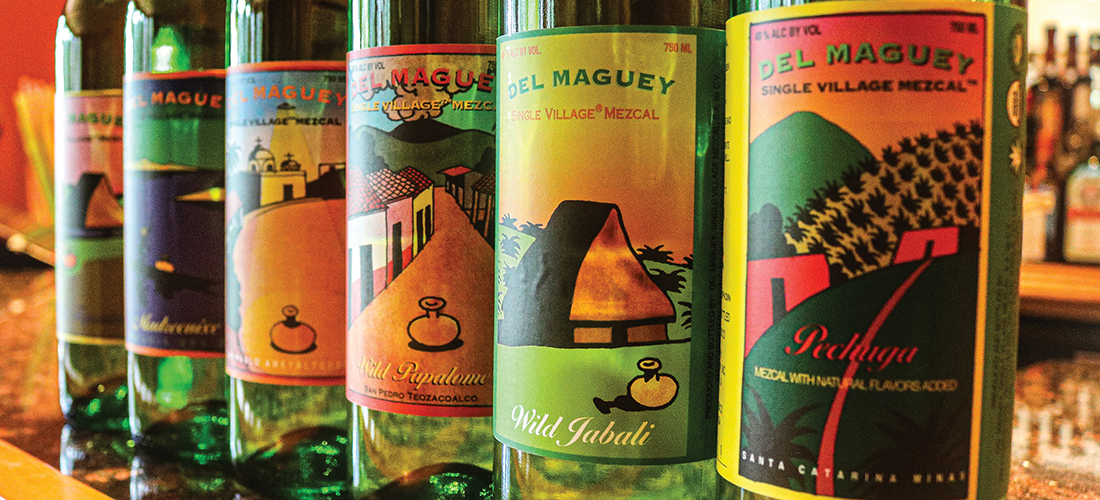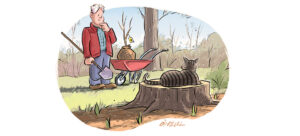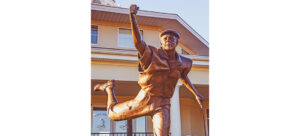
The World of Del Maguey
Mezcal so good, I forgot how to count
By Tony Cross
Back in June, I was invited to dinner and a mezcal tasting by my good friends Bo and Suze. I first met the couple six years ago when I was tending bar. Bo and I bonded over our love of spirits and cocktails. He was one of the few people I knew at the time that shared the same knowledge and appreciation of everything from cocktail books, to bars across the U.S. and the great drinks they are known for. Needless to say, we’ve been pals ever since.
In the time we’ve known each other, we’ve shared lots of great drinks, many of which were imbibed in his bar, The Bo Zone. That’s right. He’s got quite the selection, and almost everything on hand for most cocktails across the board. Along with his invitation, he informed me he’d just received a huge delivery of spirits online. Yes, you can order spirits online and have them delivered to your home in North Carolina. I’m not going to name names, but do your research and thank me later.
The majority of bottles from Bo’s latest shipment was mezcal from Del Maguey. Pronounced ma-gay, the single village Mezcal was founded in 1995 by Ron Cooper. Each bottle is made by individual family producers and, as the website states: “We are the first producer to credit each product after the village where our liquid is made. When you see our beautiful green bottles, you know it’s Del Maguey.”
After the three of us enjoyed a fabulous dinner, we retired downstairs to The Bo Zone, where many beautiful green bottles awaited us. Here are a few of my favorites from that evening. I’m including the tasting notes that Bo provided, along with my recollections. I took pictures so I would remember just in case I time-traveled — I didn’t, but I’m glad I have the pictures to remind me. They were all excellent. The mezcals, I mean.
Del Maguey Tepextate ($115)
This was the first bottle we got into. What a great start.
Bo’s notes: This glorious mezcal made from wild agave is the work of the same master mezcalero that produces the legendary Tobala (see below) bottled by Del Maguey. Tepextate expressions are rare, to say the least, and the extreme conditions that the plant grows in result in mezcals with concentrated, sweet tones of pure nectar.”
My recollections: Honeysuckle. It was a touch sweet. The problem with all of these great mezcals is you want to have another taste — there’s so much going on that you need one more little sip to figure out what your palate is picking up.
Del Maguey San Pablo Ameyaltepec ($130)
Number three on the list was this beauty from Puebla. For “mezcal” to be printed on a label, the agave has to originate from one of eight Mexican states. Puebla is now on that list.
Bo’s notes: With this extraordinary bottling from master mezcalero Aurelio Gonzalez Tobnon, Del Maguey takes a big step forward with their first official bottling from the state of Puebla. The wild Papalote agaves for this spirit were harvested after 12 to 18 years maturing to full ripeness in the remote hillsides outside the city limits. Showing off an incredible range of complexity, the spirit resolves to an umami-like level of intensity and harmony with notes that hit on the tropical, floral, spicy, savory, salty, mineral and more.
My recollections: We all agreed that the Ameyaltepec left a savory, umami flavor on the finish. What’s fun about tasting mezcal (or spirits or wine) is how there is no right or wrong. You taste what you taste. Over the years I’ve looked at tech sheets on spirits/wine provided for staff by a distillery/winery and thinking, “Nope. That’s not what I taste at all.” This was one of the times where we all thought the notes hit the nail on the head. What a finish.
Del Maguey Madrecuixe ($110)
Bo’s notes: Not far off the banks of the Red Ant River in the dense, green village of San Luis del Rio in Oaxaca, Paciano Cruz Nolasco produces some of the most traditional mezcals on Earth. This rare bottling was made from the wild grown agave species of Madrecruixe. The opening notes are herbaceous and green in nature, then slowly, layers of tropical fruit are revealed spiked with earthy, edgy flavors that all seem to fit together thanks to the gorgeous texture and elegant medium body.”
My recollections: I remember loving this. I also remember humming some Jimi Hendrix tune that was on in the background. Let’s go with: What tastes like bananas, silk, and something green for $300, Alex?
Del Maguey Tobala ($120)
When we finished tasting the recent acquisitions, Bo pulled two more off the shelf. I’ve had this one before, but it had been so long I was forced to say, “Hey, man, lemme taste that one again” out loud.
Notes from Del Maguey’s website: The Tobala maguey is found growing naturally only in the highest altitude canyons in the shade of oak trees, like truffles. It takes about eight piñas (agave hearts) to equal one piña from either of the more commonly propagated and cultivated magueys. Our Tobala has a sweet, fruity nose, with a mango and cinnamon taste and long, extra smooth finish.
My recollections: “Ahh, man, that’s awesome!” At this point I was texting certain friends (who could care less) with pictures of the different, beautiful green bottles I was sipping from. My laugh was getting audibly louder and somewhat obnoxious, even in text form.
Del Maguey Pechuga ($200)
This is the showstopper. Bo had a little more than half a bottle of the Pechuga that had been on the shelf for five years — or did he say three? — and I was honored he would share this beautiful spirit with me. The first thing I learned about Pechuga involved the use of a chicken. Don’t be afraid. A whole skinless chicken breast (pechuga) is washed thoroughly to remove any grease, then hung by a string within the still for 24 hours while a second or third distillation happens. It’s not voodoo, it balances the native apples, plums, plantains, pineapples, almonds, and white rice that were already added to the 100 liters of mezcal.
My recollections: I remember taking a few sips, smiling, saying something brainy, and then tuning out. I was transported immediately to Santa Catarina Minas. I’m a donkey. Kind of like Eeyore, but not melancholy; my mood was the equivalent of being in a commercial for unwanted facial hair where everyone is really, really, happy. Oh, and I was a cartoon. I’m in the middle of grinding piñas during mezcal production. And then I came to. Maybe I did time-travel a little. This mezcal is classy. PS
Tony Cross is a bartender (well, ex-bartender) who runs cocktail catering company Reverie Cocktails in Southern Pines.





